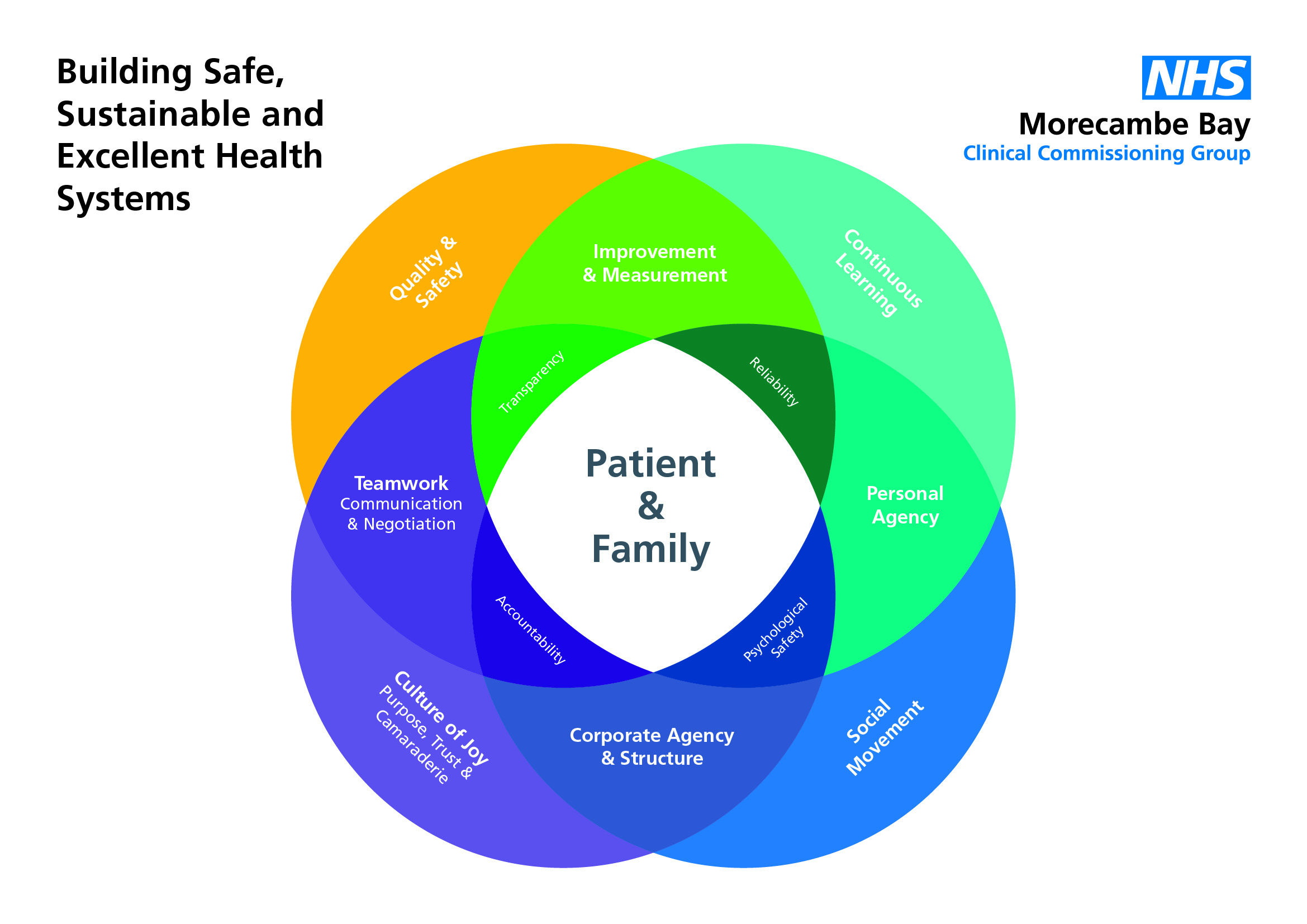 As the crisis in the Western World deepens, and the growing reality sets in that business as usual simply can no longer continue nor solve our problems, our systems must change the way they view, deal with and hold onto power. The NHS is no exception. If we want a health and social care system that is of the highest quality, safe, sustainable and economically viable for the future, we need to understand the power of social movements, both within our systems and through the wider society. This is something we are really committed to in Morecambe Bay and so it was with great delight that I listened to the excellent Helen Bevan, talk about just how vital social movements are for the NHS and healthcare, worldwide at the recent IHI conference in London, Quality 2017. This blog will be an amalgamation of what Helen shared and my own thoughts about our early experiences with social movements.
As the crisis in the Western World deepens, and the growing reality sets in that business as usual simply can no longer continue nor solve our problems, our systems must change the way they view, deal with and hold onto power. The NHS is no exception. If we want a health and social care system that is of the highest quality, safe, sustainable and economically viable for the future, we need to understand the power of social movements, both within our systems and through the wider society. This is something we are really committed to in Morecambe Bay and so it was with great delight that I listened to the excellent Helen Bevan, talk about just how vital social movements are for the NHS and healthcare, worldwide at the recent IHI conference in London, Quality 2017. This blog will be an amalgamation of what Helen shared and my own thoughts about our early experiences with social movements.
A social movement in health and social care involves us all learning to connect, collaborate, cooperate, cocreate and coproduce at a level we have never done so, until now. But our circumstances are forcing us to reconsider the ways in which we work. We need the creative substance that is within our teams to be heard and harnessed so that we cut our waste and work more effectively together. The issues we face, need facing by us all, together; not by some board in an isolated room, making decisions based on diktats from on high, on behalf of us all. But even this will not be enough. Those of us stuck in the system have become too homogenized in our thinking for us to do this exclusively from within. We need our citizens to help us re-imagine what it means for us to be healthy and well. We must stop designing things for our communities or doing things to them, instead we must design and do things with them. We must analyse, create and enact together and to do this, we must learn to solve the issues of power.
 Helen Bevan, with her background in social science, demonstrates the great debate about the interplay between our organisational structures (rules) and agency (freedom) when it comes to effecting change. Where does the “permission” come from to enact the change we need to see? Is it externally generated by those in positions of power, or is it internally generated by a personal motivation? Our experience in Carnforth and Morecambe in community conversations has been a bit of both. There are many people of incredible heart and goodness, waiting to do something new and good that will positively affect the health and wellbeing of society, but are perhaps waiting for that sense of community backing, support, encouragement or indeed permission.
Helen Bevan, with her background in social science, demonstrates the great debate about the interplay between our organisational structures (rules) and agency (freedom) when it comes to effecting change. Where does the “permission” come from to enact the change we need to see? Is it externally generated by those in positions of power, or is it internally generated by a personal motivation? Our experience in Carnforth and Morecambe in community conversations has been a bit of both. There are many people of incredible heart and goodness, waiting to do something new and good that will positively affect the health and wellbeing of society, but are perhaps waiting for that sense of community backing, support, encouragement or indeed permission.  With a bit of coaching or spurring on, we have seen some amazing initiatives begin that are bringing transformational work into our area and causing us all think differently. We need both individual agency AND corporate agency. Helen describes individual agency as being when people get more power and control in their lives – we see this in patient activation, shared-decision making and self-care – a greater sense of autonomy and responsibility. Collective agency, on the other hand, is where we see people act together, united by a common cause, harnessing the power and influence of the group whilst building mutual trust.
With a bit of coaching or spurring on, we have seen some amazing initiatives begin that are bringing transformational work into our area and causing us all think differently. We need both individual agency AND corporate agency. Helen describes individual agency as being when people get more power and control in their lives – we see this in patient activation, shared-decision making and self-care – a greater sense of autonomy and responsibility. Collective agency, on the other hand, is where we see people act together, united by a common cause, harnessing the power and influence of the group whilst building mutual trust.
We have seen this used powerfully, in just one example by our maternity liaison service committee, who together have challenged our system to think more carefully about how we communicate to women, especially at key or stressful moments of their obstetric care. These stories are now a compulsory part of training for all who work in our maternity service and have significantly improved both our skill mix and ability to provide excellent care.
What is absolutely vital to understand is that we do not become transformed alone. We are transformed when we are in relationship 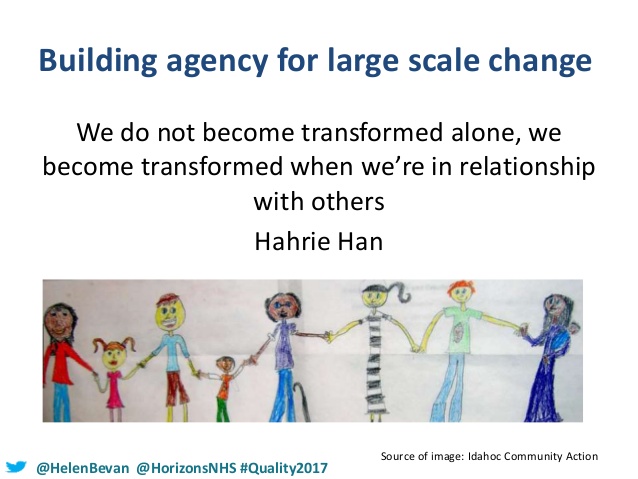 with others (Hahrie Han). The problem is that we don’t really encounter the “other” enough to be changed. However, when we let go of the kind of power that is held by the few, pushes others down, uses command and control, that is closed and transactional, and instead embrace a power that is held by the many, shared, open and relational, then we can begin to see the change we need (Hirschman and Ganz).
with others (Hahrie Han). The problem is that we don’t really encounter the “other” enough to be changed. However, when we let go of the kind of power that is held by the few, pushes others down, uses command and control, that is closed and transactional, and instead embrace a power that is held by the many, shared, open and relational, then we can begin to see the change we need (Hirschman and Ganz). 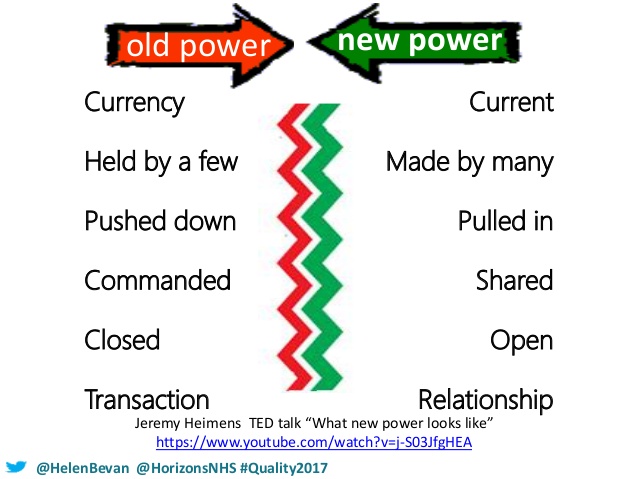
David Holzmer says that we are witnessing the collapse of expertise and the rise of collaborative sense-making. I would suggest that this has been going on for some time, but our systems have been incredibly slow at catching onto the change around us.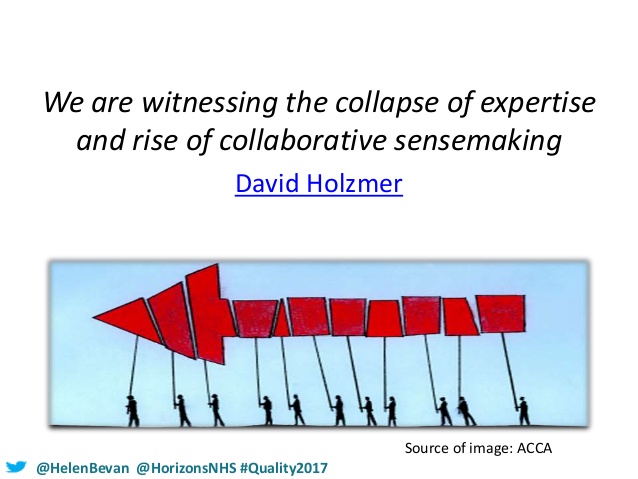
Now, what is hugely encouraging is this: research by Kollectif shows that you only need 3% of people in an organisation/society to drive the conversations with 90% of other people.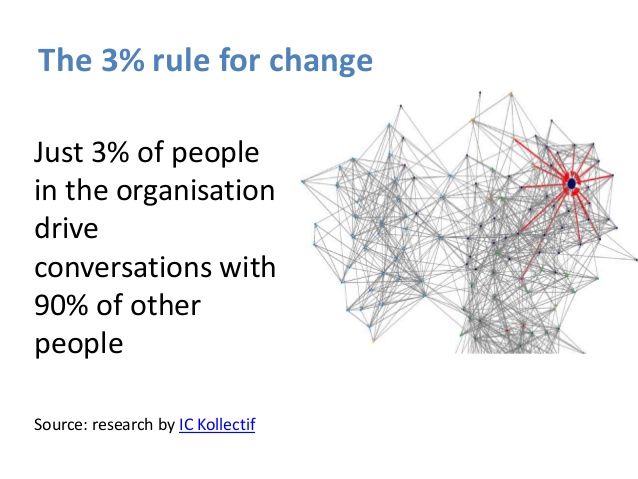 In other words, you don’t have to get everyone on board from the word go. You find your passionate people with a sense of agency, infect them with the virus and watch it spread. These people need to be a mixture of ‘lone wolves’, mobilisers and organisers. Lone wolves are people who have been trying to help change happen for a long time but can sometimes feel like an annoyance to the system, so they are given tokenistic positions, patted on the head and patronised into exhaustion. Mobilisers build power by calling large numbers of people to contribute, engage in change and take action. Organisers build power by growing leaders in a distributed network, building a community and protecting its strength. We need all of them, though mobilisers and organisers will be the most effective in creating agency and bringing about lasting change (Hahrie Han).
In other words, you don’t have to get everyone on board from the word go. You find your passionate people with a sense of agency, infect them with the virus and watch it spread. These people need to be a mixture of ‘lone wolves’, mobilisers and organisers. Lone wolves are people who have been trying to help change happen for a long time but can sometimes feel like an annoyance to the system, so they are given tokenistic positions, patted on the head and patronised into exhaustion. Mobilisers build power by calling large numbers of people to contribute, engage in change and take action. Organisers build power by growing leaders in a distributed network, building a community and protecting its strength. We need all of them, though mobilisers and organisers will be the most effective in creating agency and bringing about lasting change (Hahrie Han). 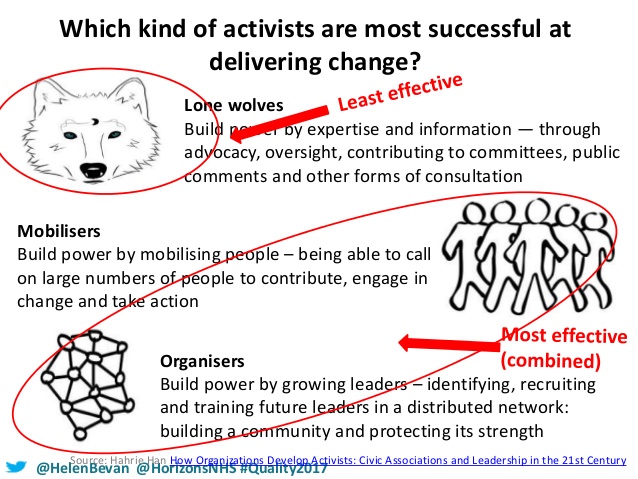
Joe Simpson says that ” great social movements get their energy by growing a distributed leadership.” The cult of celebrity can be powerful, but is not effective. The beautiful thing about a social movement is that is depends not on money, materials and technology but on relationships, commitment and community, and as the movement grows, these resources increase, rather than diminish. The problem, as Don Berwick puts it, is that leaders in position of strategic influence, are simply not seeing the resources available to the biggest problems we are facing.
Jason Leitch and Derek Feeley have powerfully shown that 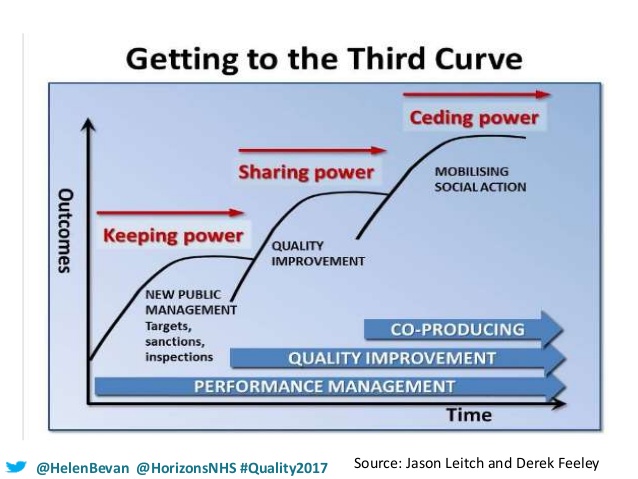 performance management (keeping the power), based on targets, sanctions and inspections can only get us so far. Quality improvement (sharing the power) gets us a little further, but mobilising social action, or co-production (ceding power) has a far greater potential to bring lasting change and far better outcomes for all.
performance management (keeping the power), based on targets, sanctions and inspections can only get us so far. Quality improvement (sharing the power) gets us a little further, but mobilising social action, or co-production (ceding power) has a far greater potential to bring lasting change and far better outcomes for all.
So, how do we catalyze a social movement and how would we know if the movement was being “successful”? Well, our experience in Morecambe Bay is that you start with the 3%. You start with those who are drawn to the conversation, who recognise the need for change and who want to be part of it. You start with transparency, with openness, honesty and vulnerability about the mess we find ourselves in and the truth that we no longer have what it takes to solve the problem. And you start with really good questions and then deeply listen to the conversation which is emerging so that we ourselves are changed and can therefore be part of the emergence of something new, which operates on an entirely different kind of power.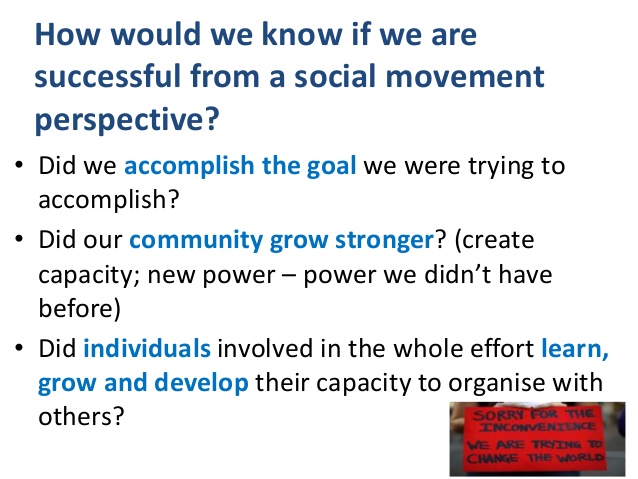
You might call this a re-humanisation of our systems based on love, trust and the hope of a positive peace for all. But this social movement is not aiming for some kind of hippy experience in which we are all sat round camp fires, singing kum-ba-yah! This social movement is looking to cause our communities to flourish with a sense of health and wellbeing, to have a health and social care movement that is safe, sustainable, socially just and truly excellent, serving the needs of the wider community to grow stronger with individuals learning, growing and developing in their capacity to live well. That is what we must measure!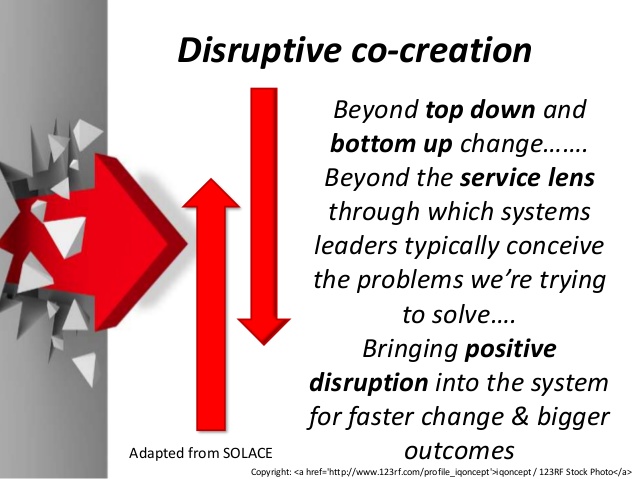
And so we need disruptive co-creation, which breaks through the top-town/bottom-up approach and causes us to see and hear like we have never done before. It is hugely exciting and enables managers to stop feeling like they have to extract as much performance as possible from the system, flogging the workforce, blocking change and innovation and inadvertently driving down the quality of care in the process.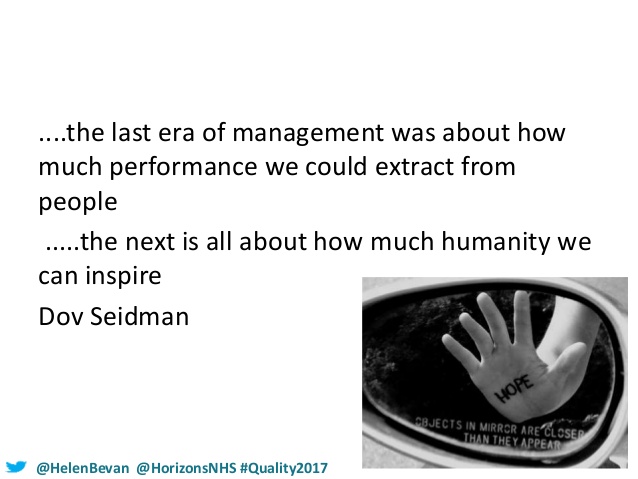
The invitation is instead to become part of the change that we all long for. If we’re going to have an NHS in the future, we have to give it back to the people and work with them. In order to do this, we have to deal with and change our relationship with the very notion of power – something I will turn my attention to on the next blog!
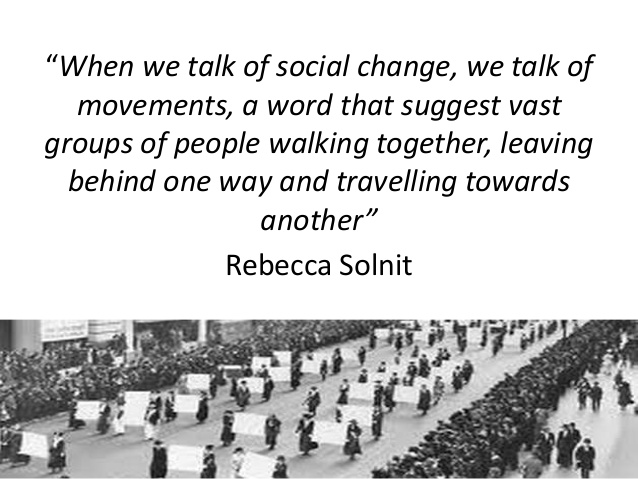
 All this week on the BBC, there has been a focus on the NHS and the crisis we are in – don’t panic Mr Mainwaring…..There is a heady mix of opinions being thrown around – Question Time became quite a furore of ideas and thoughts last night – not enough beds, not enough staff, not enough money, too much money, too many patients, too many wasted appointments, too many malingerers, too many ill people, too many old people, too many managers, too many drugs, too many drunkards, disappointed clinicians, disappointed patients, disappointed MPs, a disappointed health secretary – what are we to think and what are we to do?
All this week on the BBC, there has been a focus on the NHS and the crisis we are in – don’t panic Mr Mainwaring…..There is a heady mix of opinions being thrown around – Question Time became quite a furore of ideas and thoughts last night – not enough beds, not enough staff, not enough money, too much money, too many patients, too many wasted appointments, too many malingerers, too many ill people, too many old people, too many managers, too many drugs, too many drunkards, disappointed clinicians, disappointed patients, disappointed MPs, a disappointed health secretary – what are we to think and what are we to do? We love the NHS because it speaks something to us about our togetherness and our commitment to health justice for all. This circular argument about money is the wrong conversation and it is beginning to have a very nasty undertone about who we might be able to blame and scapegoat in order to solve the mess we are in. Let’s be very clear. The NHS is NOT in crisis because of refugees, asylum seekers, immigrants or health tourists. I’m going to stick my neck out here – it isn’t even the fault of the current and previous health secretaries, though it would be easy to play the blame game that way too. The NHS is in crisis, because the entire Western World is in crisis! Our economic systems are broken and our political systems are pretty defunct. We have built our nation state on the foundations of empire. We have built our economy on conquest and slavery and have used debt, violence and law to keep control….but everything is shaking.
We love the NHS because it speaks something to us about our togetherness and our commitment to health justice for all. This circular argument about money is the wrong conversation and it is beginning to have a very nasty undertone about who we might be able to blame and scapegoat in order to solve the mess we are in. Let’s be very clear. The NHS is NOT in crisis because of refugees, asylum seekers, immigrants or health tourists. I’m going to stick my neck out here – it isn’t even the fault of the current and previous health secretaries, though it would be easy to play the blame game that way too. The NHS is in crisis, because the entire Western World is in crisis! Our economic systems are broken and our political systems are pretty defunct. We have built our nation state on the foundations of empire. We have built our economy on conquest and slavery and have used debt, violence and law to keep control….but everything is shaking. brave enough to rewire our brains, realign our values and reimagine a different way of being together? If we accept that things simply cannot remain as they are, might we instead find one another in fresh ways and discover new ways of being in which we’re not always chasing the money, with all its strings attached, but choosing something altogether more life giving?
brave enough to rewire our brains, realign our values and reimagine a different way of being together? If we accept that things simply cannot remain as they are, might we instead find one another in fresh ways and discover new ways of being in which we’re not always chasing the money, with all its strings attached, but choosing something altogether more life giving?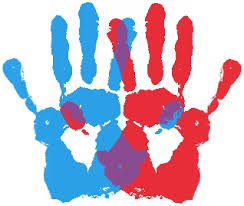 I would suggest we need two things (an ambidextrous approach) – both of which are already happening, we just need to recognise them, fan the flames and watch the new emerge, whilst Rome burns around us.
I would suggest we need two things (an ambidextrous approach) – both of which are already happening, we just need to recognise them, fan the flames and watch the new emerge, whilst Rome burns around us.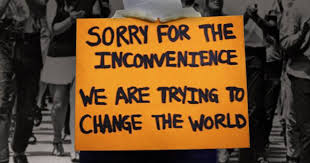 are beginning to think about how we are living and making a change. It’s a tough reality, but there is personal and corporate responsibility that we need to take. We cannot keep shoving poison into our bodies or treating them badly and expect that we will be well, or that we will be able to afford the drugs to fix us. Social movements are beginning to emerge and we need to be a part of them. Together, we can! Together we can cause corporations to change their behaviour and act in accordance with what is right, true, just, kind and loving. We can also choose to take responsibility for what we buy and how much exercise we do. Here in Morecambe Bay we are launching the Morecambe Bay Mile, encouraging everyone to move a mile a day without transport! We’re also working with our communities around diet. We’re also connecting with amazing people doing amazing things and seeing just how much kindness and goodness there is in the communities around us. Our happiness is directly linked to the quality and depth of our friendships. People being together and facing up to the issues together is absolutely key to our long term health.
are beginning to think about how we are living and making a change. It’s a tough reality, but there is personal and corporate responsibility that we need to take. We cannot keep shoving poison into our bodies or treating them badly and expect that we will be well, or that we will be able to afford the drugs to fix us. Social movements are beginning to emerge and we need to be a part of them. Together, we can! Together we can cause corporations to change their behaviour and act in accordance with what is right, true, just, kind and loving. We can also choose to take responsibility for what we buy and how much exercise we do. Here in Morecambe Bay we are launching the Morecambe Bay Mile, encouraging everyone to move a mile a day without transport! We’re also working with our communities around diet. We’re also connecting with amazing people doing amazing things and seeing just how much kindness and goodness there is in the communities around us. Our happiness is directly linked to the quality and depth of our friendships. People being together and facing up to the issues together is absolutely key to our long term health.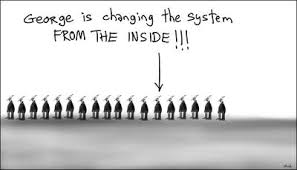 Secondly, we must stop serving the system, re-humanise it, call it in line and cause it to serve the needs of the people and the planet (the right handed approach). Those in the health and social care system must refuse to be bullied by the powers into ways of behaving, stop thinking they have the answers and therefore coming up with another new scheme to do to people and be willing to listen to and work with the emerging social movements. This will allow us to see a society that is much more well and therefore in need of less care. But where care is needed, we have to accept that we have allowed ourselves to be competitive rather than collaborative, hierarchical instead of co-operative and our own attitudes and behaviours are stopping us from giving the compassionate care we long to deliver. We cannot make excuses. We must let go of self-protectionism. We must be willing to change the way we think and behave, breaking down walls, letting go of suspicion and cutting through red tape so that we provide the care which we can. This is happening, here in Morecambe Bay – but it’s not a quick thing. We are rediscovering the power of relationship and daring to make some bold steps into delivering care very differently – but for those of you outside the system, please understand, it takes time and feels pretty scary!
Secondly, we must stop serving the system, re-humanise it, call it in line and cause it to serve the needs of the people and the planet (the right handed approach). Those in the health and social care system must refuse to be bullied by the powers into ways of behaving, stop thinking they have the answers and therefore coming up with another new scheme to do to people and be willing to listen to and work with the emerging social movements. This will allow us to see a society that is much more well and therefore in need of less care. But where care is needed, we have to accept that we have allowed ourselves to be competitive rather than collaborative, hierarchical instead of co-operative and our own attitudes and behaviours are stopping us from giving the compassionate care we long to deliver. We cannot make excuses. We must let go of self-protectionism. We must be willing to change the way we think and behave, breaking down walls, letting go of suspicion and cutting through red tape so that we provide the care which we can. This is happening, here in Morecambe Bay – but it’s not a quick thing. We are rediscovering the power of relationship and daring to make some bold steps into delivering care very differently – but for those of you outside the system, please understand, it takes time and feels pretty scary! more healthy and well and we changed our ways of working to be more collaborative and kind. It is this ambidextrous approach to health and wellbeing, in which a heady mix of an invigorated people movement and a reorientated system working together for the good of everyone everywhere, might breathe hope into other parts of the world that out of the old can come something new. Maybe it is just possible that healthcare can be provided for everyone everywhere when people are brave enough to let go of old ways, embrace the brokenness of our reality and find a new way through together.
more healthy and well and we changed our ways of working to be more collaborative and kind. It is this ambidextrous approach to health and wellbeing, in which a heady mix of an invigorated people movement and a reorientated system working together for the good of everyone everywhere, might breathe hope into other parts of the world that out of the old can come something new. Maybe it is just possible that healthcare can be provided for everyone everywhere when people are brave enough to let go of old ways, embrace the brokenness of our reality and find a new way through together. I’m telling you – it is nearly Spring time and the bulbs are beginning to break through. Can you smell the scent of something new emerging? Those rhizomal roots of the snowdrops – that interconnected underground network that shoots up its flowers, is telling us the winter of discontent is over. It’s time to turn off the radio, dial down the meta narrative of fear and instead, put on love, hope and faith, find each other, change our ways of working and step into the future we know our hearts yearn for.
I’m telling you – it is nearly Spring time and the bulbs are beginning to break through. Can you smell the scent of something new emerging? Those rhizomal roots of the snowdrops – that interconnected underground network that shoots up its flowers, is telling us the winter of discontent is over. It’s time to turn off the radio, dial down the meta narrative of fear and instead, put on love, hope and faith, find each other, change our ways of working and step into the future we know our hearts yearn for.
 In my last blog, I talked about the exponential potential of what could be possible if clinicians worked together in a more collaborative way. However, far more can be achieved if we work together in and with our communities to create a social movement together around being more healthy and well. I’ve talked previously about the “battle royale” that occurred between Béchamp and Pasteur over whether we should promote health or fight disease. The answer is, of course, that we need to do both, but the clinical community is not equipped with the resource or power to do it alone.
In my last blog, I talked about the exponential potential of what could be possible if clinicians worked together in a more collaborative way. However, far more can be achieved if we work together in and with our communities to create a social movement together around being more healthy and well. I’ve talked previously about the “battle royale” that occurred between Béchamp and Pasteur over whether we should promote health or fight disease. The answer is, of course, that we need to do both, but the clinical community is not equipped with the resource or power to do it alone. crises we now face are too much for us to do anything about. We are in the midst of a battle, which we are currently losing and it is time to gird our loins for a turning of the tide. Here in Morecambe Bay, we have started a conversation, not just among the Clinical Community but with the wider population about how we might become the healthiest place in the UK. Yes, we mean this in a very holistic way, but there are also some specific foci we have so we can together reverse some of the appalling health statistics we are facing.
crises we now face are too much for us to do anything about. We are in the midst of a battle, which we are currently losing and it is time to gird our loins for a turning of the tide. Here in Morecambe Bay, we have started a conversation, not just among the Clinical Community but with the wider population about how we might become the healthiest place in the UK. Yes, we mean this in a very holistic way, but there are also some specific foci we have so we can together reverse some of the appalling health statistics we are facing. I suggest that within a generation, if we wanted to, we could render Type 2 Diabetes a rare diagnosis. We can do this through encouraging far more healthy lifestyles in our children and young people now, like running a mile a day and learning to eat food that doesn’t actually harm them! I believe we could significantly reduce the need for so many people to be taking medication for hypertension and diabetes now, prevent many strokes and heart attacks, by being violent towards these conditions with major changes in lifestyle, though diet and exercise, rather than the prescription of drugs, using coaching, peer support and local champions to give psychological motivation and encouragement. We are beginning to have some excellent discussions and develop some exciting plans around this.
I suggest that within a generation, if we wanted to, we could render Type 2 Diabetes a rare diagnosis. We can do this through encouraging far more healthy lifestyles in our children and young people now, like running a mile a day and learning to eat food that doesn’t actually harm them! I believe we could significantly reduce the need for so many people to be taking medication for hypertension and diabetes now, prevent many strokes and heart attacks, by being violent towards these conditions with major changes in lifestyle, though diet and exercise, rather than the prescription of drugs, using coaching, peer support and local champions to give psychological motivation and encouragement. We are beginning to have some excellent discussions and develop some exciting plans around this. pull themselves back from the brink of a lifetime of medication and we should use all medication reviews as a chance to help people adopt lifestyles that might reverse the need for such drugs. In the process, we would also significantly reverse our number of cancer diagnoses – many of which are linked to our lifestyle choices. We simply can’t afford for our current and failing approach to continue. We need to be braver together! And this means the NHS must be willing to partner in new ways, not only with local people, but also with businesses like the major supermarkets to help reverse our current direction towards the abyss, in which there is no longer a healthcare system that serves the needs of everyone, no matter where they come from or how much they do or don’t earn.
pull themselves back from the brink of a lifetime of medication and we should use all medication reviews as a chance to help people adopt lifestyles that might reverse the need for such drugs. In the process, we would also significantly reverse our number of cancer diagnoses – many of which are linked to our lifestyle choices. We simply can’t afford for our current and failing approach to continue. We need to be braver together! And this means the NHS must be willing to partner in new ways, not only with local people, but also with businesses like the major supermarkets to help reverse our current direction towards the abyss, in which there is no longer a healthcare system that serves the needs of everyone, no matter where they come from or how much they do or don’t earn. We can absolutely do this!! It’s going to take some serious resolve and we’re going to have to withstand the fear and pressure of some pretty powerful lobbies, like the sugar, alcohol, tobacco and pharmaceutical giants, and perhaps even the government itself, but it is time for us to do the impossible. With love, hope and faith, we can do this! Yes we need to focus on schools and work places. Yes, we need to partner with organisations we’ve never worked with before. Yes, we need a far more effective media strategy and yes, we need to allow clinicians to work very differently. But we cannot do nothing. So let’s try something a whole lot more radical. That’s what we’re going for in Morecambe Bay – not just better care together, but better health together – you can watch and wait, and see if we sink or swim, or you can join us!
We can absolutely do this!! It’s going to take some serious resolve and we’re going to have to withstand the fear and pressure of some pretty powerful lobbies, like the sugar, alcohol, tobacco and pharmaceutical giants, and perhaps even the government itself, but it is time for us to do the impossible. With love, hope and faith, we can do this! Yes we need to focus on schools and work places. Yes, we need to partner with organisations we’ve never worked with before. Yes, we need a far more effective media strategy and yes, we need to allow clinicians to work very differently. But we cannot do nothing. So let’s try something a whole lot more radical. That’s what we’re going for in Morecambe Bay – not just better care together, but better health together – you can watch and wait, and see if we sink or swim, or you can join us! We need to reimagine ourselves as all being part of a team who are together tackling the health crises we are facing. We know only too well that, as just one example among many, we are failing kids with asthma because we have not joined up our resources or thinking adequately enough. Yes there are major issues with housing, smoking and pollution, but let’s not point the finger or push the problem somewhere else. Let’s use the phenomenal brains God has given us to pull the right people round the table and work out what we’re going to do about it. Let’s change the way we spend our time so that we’re in schools, we’re listening to our communities and we’re partnering together outside of our normal comfort zones to change the health of the generations to come. We know only too well, that if we don’t shift our focus towards population health and work more intentionally with our communities, doing things with them rather than too them, we will never win this battle. We’re not about playing political games. We are about working with our communities to create optimal health for every person no matter who they are or where they are from. We need to be braver, push the boat away from the shore we know and face the uncertain waters of working altogether differently. In my next blog I will explore some of the possible ways we could work differently.
We need to reimagine ourselves as all being part of a team who are together tackling the health crises we are facing. We know only too well that, as just one example among many, we are failing kids with asthma because we have not joined up our resources or thinking adequately enough. Yes there are major issues with housing, smoking and pollution, but let’s not point the finger or push the problem somewhere else. Let’s use the phenomenal brains God has given us to pull the right people round the table and work out what we’re going to do about it. Let’s change the way we spend our time so that we’re in schools, we’re listening to our communities and we’re partnering together outside of our normal comfort zones to change the health of the generations to come. We know only too well, that if we don’t shift our focus towards population health and work more intentionally with our communities, doing things with them rather than too them, we will never win this battle. We’re not about playing political games. We are about working with our communities to create optimal health for every person no matter who they are or where they are from. We need to be braver, push the boat away from the shore we know and face the uncertain waters of working altogether differently. In my next blog I will explore some of the possible ways we could work differently. As clinicians we must, as many have stated this week, build bridges not walls. There is far too much division, suspicion and competition amongst us. (Here comes the swearing)…..I was in a conversation with a consultant colleague recently and he was relaying to me that another consultant referred to GPs as a “bunch of Fuck Wits”. In a separate conversation, one of my GP colleagues referred to consultants as a “bunch of arrogant Shits”. These kind of attitudes pervade the NHS and have created a culture of dishonour, distrust and division. Honestly! We’re better than this. How are we going to create the new workforce of the future that works across our currently artificial boundaries if we don’t teach them basic respect? This week a patient came to see me because he was dismayed at having to have seen a nurse at the hospital after suffering a significant condition and wanted to check that I, as a doctor, was happy with what he had been told. I could have laughed it off, but I wanted to stand up for my nursing colleague, who actually has far more expertise in this area of medicine than I do. The advice he had been given was perfect and completely in line with the best guidance available. We must not be afraid to challenge attitudes that are antiquated and out of place. More than ever, we need a culture of honour. A culture of honour is one in which we believe the best of each other, speak well of each other and appreciate our brilliantly necessary but differing gifts and expertise. We need to work out how we work effectively together for the best of the people we serve. We need to connect with each other and rehumanise the system in which we work. When was the last time you met as a cross cultural or multidisciplinary team and simply told each other what you love and appreciate about each other and the work you do? If we can’t learn to be more relationally whole, we will continue to work in the midst of serious dysfunction and strife. Come on – amongst us we have some remarkable gifts of wisdom, healing and hope. Let’s build the kind of culture and community amongst us that stands shoulder to shoulder, changes the story in the media and speaks with one voice to the powers that we are about the a new way of working together through relationship not hierarchy and fear. What might we really achieve together? It is this kind of collaborative clinical community that can change the future of healthcare, not just in the UK, but right across the globe.
As clinicians we must, as many have stated this week, build bridges not walls. There is far too much division, suspicion and competition amongst us. (Here comes the swearing)…..I was in a conversation with a consultant colleague recently and he was relaying to me that another consultant referred to GPs as a “bunch of Fuck Wits”. In a separate conversation, one of my GP colleagues referred to consultants as a “bunch of arrogant Shits”. These kind of attitudes pervade the NHS and have created a culture of dishonour, distrust and division. Honestly! We’re better than this. How are we going to create the new workforce of the future that works across our currently artificial boundaries if we don’t teach them basic respect? This week a patient came to see me because he was dismayed at having to have seen a nurse at the hospital after suffering a significant condition and wanted to check that I, as a doctor, was happy with what he had been told. I could have laughed it off, but I wanted to stand up for my nursing colleague, who actually has far more expertise in this area of medicine than I do. The advice he had been given was perfect and completely in line with the best guidance available. We must not be afraid to challenge attitudes that are antiquated and out of place. More than ever, we need a culture of honour. A culture of honour is one in which we believe the best of each other, speak well of each other and appreciate our brilliantly necessary but differing gifts and expertise. We need to work out how we work effectively together for the best of the people we serve. We need to connect with each other and rehumanise the system in which we work. When was the last time you met as a cross cultural or multidisciplinary team and simply told each other what you love and appreciate about each other and the work you do? If we can’t learn to be more relationally whole, we will continue to work in the midst of serious dysfunction and strife. Come on – amongst us we have some remarkable gifts of wisdom, healing and hope. Let’s build the kind of culture and community amongst us that stands shoulder to shoulder, changes the story in the media and speaks with one voice to the powers that we are about the a new way of working together through relationship not hierarchy and fear. What might we really achieve together? It is this kind of collaborative clinical community that can change the future of healthcare, not just in the UK, but right across the globe. have huge health inequalities. There are major issues with housing, economic policies that are not working for huge swathes of our population, with more people having to use food banks, struggling with fuel poverty, living in damp houses and unable to make ends meet. Yes, our kids are spending more time on screens and less time in activity. Yes, the sugar lobby, alcohol lobby and advertising giants have far too much power. Supermarkets are designed deliberately so that we buy things that are bad for us. And sometimes, we just make poor choices (if you can call them choices, which for some people, they aren’t always) – we do not all live as healthily as we could – we eat the wrong stuff, work highly stressful jobs, and exercise less than we are recommended to. Mental health issues are on the rise, especially for teenagers, due to crazy targets and league tables, with all the pressures they face. We are less happy and more separated than we ever used to be, despite the rise in social media…..(or maybe because of it……)…..Man, I can paint a negative picture – it’s like storm clouds and darkness everywhere……..
have huge health inequalities. There are major issues with housing, economic policies that are not working for huge swathes of our population, with more people having to use food banks, struggling with fuel poverty, living in damp houses and unable to make ends meet. Yes, our kids are spending more time on screens and less time in activity. Yes, the sugar lobby, alcohol lobby and advertising giants have far too much power. Supermarkets are designed deliberately so that we buy things that are bad for us. And sometimes, we just make poor choices (if you can call them choices, which for some people, they aren’t always) – we do not all live as healthily as we could – we eat the wrong stuff, work highly stressful jobs, and exercise less than we are recommended to. Mental health issues are on the rise, especially for teenagers, due to crazy targets and league tables, with all the pressures they face. We are less happy and more separated than we ever used to be, despite the rise in social media…..(or maybe because of it……)…..Man, I can paint a negative picture – it’s like storm clouds and darkness everywhere…….. But what if it wasn’t that way? What if we got a bit angry about it, but instead of finding someone to blame and pointing the finger; instead of getting all tribal and throwing stones at others, we chose to use our energies creatively to find solutions, to work together and make positive changes?! Let’s put away our pointing fingers and our ranting tongues and let’s work together for a better future for everyone! Doesn’t that sound good?! It’s what we’re trying here in Morecambe Bay, and I’m hoping it spreads like wild fire so that we can become a place where health abounds and beauty surrounds (that’s the motto of this place!). That doesn’t mean we stop speaking truth to power, but we also let our actions (and maybe our votes) speak louder than ever before.
But what if it wasn’t that way? What if we got a bit angry about it, but instead of finding someone to blame and pointing the finger; instead of getting all tribal and throwing stones at others, we chose to use our energies creatively to find solutions, to work together and make positive changes?! Let’s put away our pointing fingers and our ranting tongues and let’s work together for a better future for everyone! Doesn’t that sound good?! It’s what we’re trying here in Morecambe Bay, and I’m hoping it spreads like wild fire so that we can become a place where health abounds and beauty surrounds (that’s the motto of this place!). That doesn’t mean we stop speaking truth to power, but we also let our actions (and maybe our votes) speak louder than ever before. We’re talking together, taking time to dream about what it would be like if we were the healthiest area in the UK. We’re training up many people to host conversations, so that we break down walls and learn to collaborate for the sake of everyone. We’re not just dreaming about physical health, but mental, social and systemic health as well. We’re encouraging those who want to rise up and take some leadership, to be pioneers in the stuff they are passionate about. Even in my little town, we now have a mental health cafe that is literally saving people’s lives, because a lady called Jane wanted to make a difference. We have a cafe for all the people who have circulation problems because one of our nurses wanted to break people’s isolation and improve their healing rates at the same time.
We’re talking together, taking time to dream about what it would be like if we were the healthiest area in the UK. We’re training up many people to host conversations, so that we break down walls and learn to collaborate for the sake of everyone. We’re not just dreaming about physical health, but mental, social and systemic health as well. We’re encouraging those who want to rise up and take some leadership, to be pioneers in the stuff they are passionate about. Even in my little town, we now have a mental health cafe that is literally saving people’s lives, because a lady called Jane wanted to make a difference. We have a cafe for all the people who have circulation problems because one of our nurses wanted to break people’s isolation and improve their healing rates at the same time.  We’ve got a carers cafe, a dementia cafe and will soon have a breathing cafe for those who have severe COPD, sharing ideas and diminishing anxiety. We’ve got exercise classes to help with pain, a community choir, dog poo wardens to help us take more pride when we walk down the street and food banks to help those who can no longer afford to eat.
We’ve got a carers cafe, a dementia cafe and will soon have a breathing cafe for those who have severe COPD, sharing ideas and diminishing anxiety. We’ve got exercise classes to help with pain, a community choir, dog poo wardens to help us take more pride when we walk down the street and food banks to help those who can no longer afford to eat.![image[1]](http://reimagininghealth.com/wp-content/uploads/2016/03/image1.jpg) We have 2000 kids aged 4-11 running a mile a day at school with staggering results for our children here in terms of physical, mental and educational health. We’re hoping over time, this becomes the Morecambe Bay Mile, part of a cultural shift towards being more active. We are working with local chefs and supermarkets to enable people with pre-diabetes or weight struggles to eat more healthily. We’re choosing to lead by example in the NHS to work well and flourish in our work places. We’ve made a commitment to see the 5 ways to wellbeing in every NHS organisation and we’re hoping many other systems and businesses will follow us in this. We’re finding radical ways to help people who are struggling with alcohol and drug addiction, get free and stay free with amazing results. We’re helping people live well with and beyond cancer.
We have 2000 kids aged 4-11 running a mile a day at school with staggering results for our children here in terms of physical, mental and educational health. We’re hoping over time, this becomes the Morecambe Bay Mile, part of a cultural shift towards being more active. We are working with local chefs and supermarkets to enable people with pre-diabetes or weight struggles to eat more healthily. We’re choosing to lead by example in the NHS to work well and flourish in our work places. We’ve made a commitment to see the 5 ways to wellbeing in every NHS organisation and we’re hoping many other systems and businesses will follow us in this. We’re finding radical ways to help people who are struggling with alcohol and drug addiction, get free and stay free with amazing results. We’re helping people live well with and beyond cancer. We’re changing the way consultations happen in the NHS to enable people to make more informed and better choices about their own health and conditions, so they feel empowered to make changes that work for them rather than beaten up when they go for an appointment! We’re launching the Morecambe Bay Poverty Truth challenge, learning from those who are lived
We’re changing the way consultations happen in the NHS to enable people to make more informed and better choices about their own health and conditions, so they feel empowered to make changes that work for them rather than beaten up when they go for an appointment! We’re launching the Morecambe Bay Poverty Truth challenge, learning from those who are lived 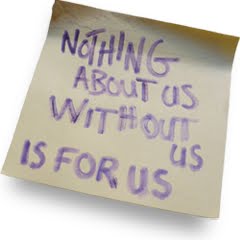 experts in poverty to help us work together and care better for those most struggling in our society. We’re having difficult conversations about death to help people be prepared for every eventuality.
experts in poverty to help us work together and care better for those most struggling in our society. We’re having difficult conversations about death to help people be prepared for every eventuality. will be awakened? What other partnerships, collaborations and relationships might be formed? Being all tribal and accusatory of others saps our energy and stops us being creative. Mud slinging and blame will achieve little. We have to work from where we are. We have to build bridges and work together. We have to build a future of positive peace and that means binary thinking is over! The future doesn’t have to be full of doom and gloom. It is alive with hope! What resources might we find? What talents might we discover? What might we see develop over the next 12 months/years/decades as we look for solutions together for a better future for everybody? Don’t you feel just a little bit excited?
will be awakened? What other partnerships, collaborations and relationships might be formed? Being all tribal and accusatory of others saps our energy and stops us being creative. Mud slinging and blame will achieve little. We have to work from where we are. We have to build bridges and work together. We have to build a future of positive peace and that means binary thinking is over! The future doesn’t have to be full of doom and gloom. It is alive with hope! What resources might we find? What talents might we discover? What might we see develop over the next 12 months/years/decades as we look for solutions together for a better future for everybody? Don’t you feel just a little bit excited? If I were to design a health centre, it would not look like any of the places I work in. They are all far too clinical and are probably not very conducive to healing. For starters, there would be a whole lot more natural light, with beautiful artwork (I have some amazing pieces in my room now, by a brilliant local artist, Emma Hamilton) and sense of a continuum with the landscape. There would be places for people to talk with each other around tables where food and drink could be served, isolation broken and community restored. There would be places to encourage exercise or mindfulness through colouring. My room would have a piano in the corner and it would be filled with art, poems, quotes and there would be huge windows with magnificent views of the sea.
If I were to design a health centre, it would not look like any of the places I work in. They are all far too clinical and are probably not very conducive to healing. For starters, there would be a whole lot more natural light, with beautiful artwork (I have some amazing pieces in my room now, by a brilliant local artist, Emma Hamilton) and sense of a continuum with the landscape. There would be places for people to talk with each other around tables where food and drink could be served, isolation broken and community restored. There would be places to encourage exercise or mindfulness through colouring. My room would have a piano in the corner and it would be filled with art, poems, quotes and there would be huge windows with magnificent views of the sea. who I am. Even now, I spend a lot of time laughing with my patients. Laughter is so good! It is healing in and of itself. There would be time for music. I would sing to my patients (they might well leave faster!)……Every doctor I know has talents, gifts, hobbies, and hidden depths that are rarely used when they encounter their patients. I wonder how much more effective we might be as healers, if we reconnected with the God-given sense of who we are and what makes our own hearts sing.
who I am. Even now, I spend a lot of time laughing with my patients. Laughter is so good! It is healing in and of itself. There would be time for music. I would sing to my patients (they might well leave faster!)……Every doctor I know has talents, gifts, hobbies, and hidden depths that are rarely used when they encounter their patients. I wonder how much more effective we might be as healers, if we reconnected with the God-given sense of who we are and what makes our own hearts sing.
 the Nation State is beginning to crumble all around us. Let me just repeat that difficult statement in another way. The grandfather that is the Nation State is now utterly riddled with a cancer and it is dying. The cancer, like all cancers needs ever increasing growth in order to sustain it’s life and our economy is set up to feed it, but even built on the pyramid of power, control and debt, it can no longer survive. Like any dying man, it is holding on for dear life and as it does so, it puts the squeeze ever tighter on to health, education and other public services, pretending it is still powerful, controlling public services through the slashing of budgets and ever tighter and undeliverable targets whilst not actually dealing with it’s debt issue at all, but telling us all a story that it is. And the mouth of
the Nation State is beginning to crumble all around us. Let me just repeat that difficult statement in another way. The grandfather that is the Nation State is now utterly riddled with a cancer and it is dying. The cancer, like all cancers needs ever increasing growth in order to sustain it’s life and our economy is set up to feed it, but even built on the pyramid of power, control and debt, it can no longer survive. Like any dying man, it is holding on for dear life and as it does so, it puts the squeeze ever tighter on to health, education and other public services, pretending it is still powerful, controlling public services through the slashing of budgets and ever tighter and undeliverable targets whilst not actually dealing with it’s debt issue at all, but telling us all a story that it is. And the mouth of 



 h and among the communities most affected. Leaders must learn to ‘hold the space open’ for the new to emerge. It will mean understanding that we must make choices about which targets we do and don’t decide to meet, prioritising some services over others and taking better care of ourselves individually and in community. But it is not a time to lose hope! There is much goodness to come, much rediscovering to take place. Much creative reimagining to enjoy. Many songs to be sung. So, let’s face the music and dance.
h and among the communities most affected. Leaders must learn to ‘hold the space open’ for the new to emerge. It will mean understanding that we must make choices about which targets we do and don’t decide to meet, prioritising some services over others and taking better care of ourselves individually and in community. But it is not a time to lose hope! There is much goodness to come, much rediscovering to take place. Much creative reimagining to enjoy. Many songs to be sung. So, let’s face the music and dance.